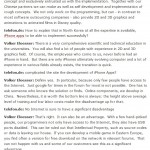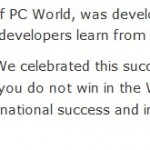Martyn Williams releases three DPRK stories this week all covering interesting issues…
North Korea Moves Quietly onto the Internet
North Korea, one of the world’s few remaining information black holes, has taken the first step toward a fully fledged connection to the Internet. But a connection, if it comes, is unlikely to mean freedom of information for North Korea’s citizens.
In the past few months, a block of 1,024 Internet addresses, reserved for many years for North Korea but never touched, has been registered to a company with links to the government in Pyongyang.
The numeric IP addresses lie at the heart of communication on the Internet. Every computer connected to the network needs its own address so that data can be sent and received by the correct servers and computers. Without them, communication would fall apart.
It is unclear how the country’s secretive leadership plans to make use of the addresses. It seems likely they will be assigned for military or government use, but experts say it is impossible to know for sure.
North Korea’s move toward the Internet comes as it finds itself increasingly isolated on the world stage. The recent sinking of a South Korean warship has been blamed on the insular country. As a result, there are calls for tougher sanctions that would isolate North Korea further.
“There is no place for the Internet in contemporary DPRK,” said Leonid A. Petrov, a lecturer in Korean studies at The University of Sydney, referring to the Democratic People’s Republic of Korea. “If the people of North Korea were to have open access to the World Wide Web, they would start learning the truth that has been concealed from them for the last six decades.”
“Unless Kim Jong-Il or his successors feel suicidal, the Internet, like any other free media, will never be allowed in North Korea,” he said.
The North Korean addresses were recently put under the control of Star Joint Venture, a Pyongyang-based company that is partly controlled by Thailand’s Loxley Pacific. The Thai company has experience working with North Korea on high-tech projects, having built North Korea’s first cellular telephone network, Sunnet, in 2002.
Loxley acknowledged that it is working on a project with Pyongyang, but Sahayod Chiradejsakulwong, a manager at the company, wouldn’t elaborate on plans for the addresses.
“This is a part of our business that we do no want to provide information about at the moment,” he said.
A connection to the Internet would represent a significant upgrade of the North’s place in cyberspace, but it’s starting from a very low base.
At present the country relies on servers in other countries to disseminate information. The Web site of the Korea Central News Agency, the North’s official mouthpiece, runs on a server in Japan, while Uriminzokkiri, the closest thing the country has to an official Web site, runs from a server in China.
North Korean citizens have access to a nationwide intranet system called Kwangmyong, which was established around 2000 by the Pyongyang-based Korea Computer Center. It connects universities, libraries, cybercafes and other institutions with Web sites and e-mail, but offers no links to the outside world.
Connections to the actual Internet are severely limited to the most elite members of society. Estimates suggest no more than a few thousand North Koreans have access to the Internet, via a cross-border hook-up to China Netcom. A second connection exists, via satellite to Germany, and is used by diplomats and companies.
For normal citizens of North Korea, the idea of an Internet hook-up is unimaginable, Petrov said.
Kim Jong-Il, the de-facto leader of the country, appears all too aware of the destructive power that freedom of information would have to his regime.
While boasting of his own prowess online at an inter-Korean summit meeting in 2007, he reportedly rejected an Internet connection to the Kaesong Industrial Park, the jointly run complex that sits just north of the border, and said that “many problems would arise if the Internet at the Kaesong Park is connected to other parts of North Korea.”
Kim himself has made no secret of the Internet access that he enjoys, and famously asked then-U.S. Secretary of State Madeleine Albright for her e-mail address during a meeting in 2000.
The government’s total control over information extends even as far as requiring radios be fixed on domestic stations so foreign voices cannot be heard.
The policy shows no signs of changing, so any expansion of the Internet into North Korea would likely be used by the government, military or major corporations.
The World’s Most Unusual Outsourcing Destination
Think of North Korea, and repression, starvation and military provocation are probably the first things that come to mind. But beyond the geopolitical posturing, North Korea has also been quietly building up its IT industry.
Universities have been graduating computer engineers and scientists for several years, and companies have recently sprung up to pair the local talent with foreign needs, making the country perhaps the world’s most unusual place for IT outsourcing.
With a few exceptions, such as in India, outsourcing companies in developing nations tend to be small, with fewer than 100 employees, said Paul Tija, a Rotterdam-based consultant on offshoring and outsourcing. But North Korea already has several outsourcers with more then 1,000 employees.
“The government is putting an emphasis on building the IT industry,” he said. “The availability of staff is quite large.”
At present, the country’s outsourcers appear to be targeting several niche areas, including computer animation, data input and software design for mobile phones. U.S. government restrictions prevent American companies from working with North Korean companies, but most other nations don’t have such restrictions.
The path to IT modernization began in the 1990s but was cemented in the early 2000s when Kim Jong Il, the de-facto leader of the country, declared people who couldn’t use computers to be one of the three fools of the 21st century. (The others, he said, are smokers and those ignorant of music.)
But outsourcing in North Korea isn’t always easy.
Language can be a problem, and a lack of experience dealing with foreign companies can sometimes slow business dealings, said Tija. But the country has one big advantage.
“It is one of the most competitive places in the world. There are not many other countries where you can find the same level of knowledge for the price,” said Tija.
The outsourcer with the highest profile is probably Nosotek. The company, established in 2007, is also one of the few Western IT ventures in Pyongyang, the North Korean capital.
“I understood that the North Korean IT industry had good potential because of their skilled software engineers, but due to the lack of communication it was almost impossible to work with them productively from outside,” said Volker Eloesser, president of Nosotek. “So I took the next logical step and started a company here.”
Nosotek uses foreign expats as project managers to provide an interface between customers and local workers. In doing so it can deliver the level of communication and service its customers expect, Eloesser said.
On its Web site the company boasts access to the best programmers in Pyongyang.
“You find experts in all major programming languages, 3D software development, 3D modelling and design, various kind of server technologies, Linux, Windows and Mac,” he said.
Nosotek’s main work revolves around development of Flash games and games for mobile phones. It’s had some success and claims that one iPhone title made the Apple Store Germany’s top 10 for at least a week, though it wouldn’t say which one.
Several Nosotek-developed games are distributed by Germany’s Exonet Games, including one block-based game called “Bobby’s Blocks.”
“They did a great job with their latest games and the communication was always smooth,” said Marc Busse, manager of digital distribution at the Leipzig-based company. “There’s no doubt I would recommend Nosotek if someone wants to outsource their game development to them.”
Eloesser admits there are some challenges to doing business from North Korea.
“The normal engineer has no direct access to the Internet due to government restrictions. This is one of the main obstacles when doing IT business here,” he said. Development work that requires an Internet connection is transferred across the border to China.
But perhaps the biggest problem faced by North Korea’s nascent outsourcing industry is politics.
Sanctions imposed on the country by the United States make it all but impossible for American companies to trade with North Korea.
“I know several American companies that would love to start doing IT outsourcing in North Korea, but because of political reasons and trade embargoes they can’t,” Tija said.
Things aren’t so strict for companies based elsewhere, including those in the European Union, but the possible stigma of being linked to North Korea and its ruling regime is enough to make some companies think twice.
The North Korean government routinely practices arbitrary arrest, detention, torture and ill treatment of detainees, and allows no political opposition, free media or religious freedom, according to the most recent annual report from Human Rights Watch. Hundreds of thousands of citizens are kept in political prison camps, and the country carries out public executions, the organization said.
With this reputation some companies might shy away from doing business with the country, but Exonet Games didn’t have any such qualms, said Busse.
“It’s not like we worked with the government,” he said. “We just worked with great people who have nothing to do with the dictatorship.”
Radio Wars Between North and South Korea (YouTube Video)


